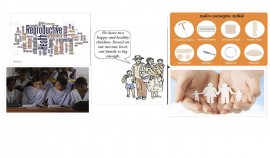"Family Planning and Youth"

The World Health Organization defines Family Planning as “The ability of individuals and couples to anticipate and attain their desired number of children and the spacing and timing of their births. It is achieved through the use of contraceptive methods and the treatment of involuntary infertility.” The definition itself helps us understand the benefits of Family Planning. Avoiding unintended pregnancies, reducing the spread of Sexually Transmitted Diseases (STDs), and helping reduce the rates of infertility by addressing the problem of STDs are the most important ones.
In addition, the benefits achieved by individuals, families as well as societies highlight the importance of family planning. In the 1968 International Conference on Human Rights, Family planning was declared a basic human right. And 50 years later, still many remain deprived of this right throughout the world for various reasons. From “?????? ??????” to “?????? ?????” the concept of Family Planning has evolved with time. The understanding and lifestyle of people have also changed with time and education. “???????? ???? ??? ????? ??????” this has been a focus of Family Planning. From “???????? ?????????? ??????” to “???? ?????? ???? ??????” we sure have come a long way.
Beyond these huge achievements, the unmet needs of family planning still remain high. Adolescents and youth build their identity by integration of feelings and desires and sexual activity often begin in this period. Sexual education and health promotion should take place before sexual activity is initiated. Thus, it is important to involve youths in FP-related activities.
Adolescents and youths are the center of everything we want to achieve. Today’s youth are tomorrow’s parents. Their Sexual and Reproductive Health (SRH) decisions today will affect both their physical and mental wellbeing for years to come. The concept of youth-friendly FP services has developed in our country too. Almost every health centers now have an adolescent and youth-friendly corner. Despite that, many youths have not been able to access the services. As a nurse, I still see many unintended pregnancies many of whom are teenagers and youths. Such pregnancies can lead to unsafe abortion and various health complications. From lack of proper information to fear to exposure, there are various reasons for risk behaviors and not seeking proper services. Thus, to create favorable and youth-friendly FP services, focusing on Comprehensive Sexuality Education (CSE) and involvement of youth themselves to impart knowledge is important. Investing in adolescents and youth means investing in a better future.
Let’s create a stigma-free society. Let’s practice informed choice. Let’s focus on Rights-based family planning.
